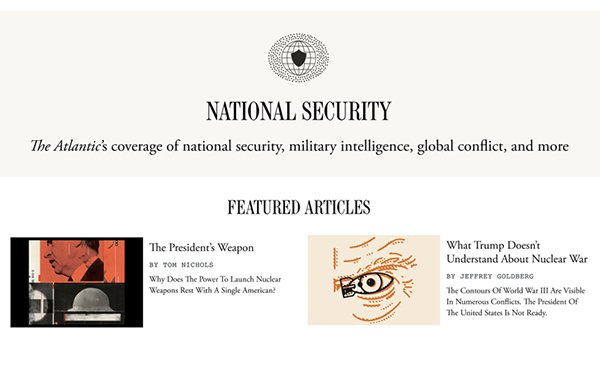
The technology of national security has
changed since The Atlantic was founded in 1857. But even then, the magazine quickly achieved a certain authority: Abraham Lincoln said that a favorable article in The
Atlantic could save him “half a dozen battles,” notes Jeffrey Goldberg, the current editor in chief, in a letter.
The reason for this historical reference is
that The Atlantic is launching a new National Security section and newsletter to expand its reporting on the intersection of national defense, technology, and
global conflict.
The Atlantic's August print issue focuses on the topic with a cover package titled “Eighty Years on the Edge,” an examination of 80 years of
life in the Atomic Age.
advertisement
advertisement
“Today, as the post–World War II international order constructed and maintained by the United States is under unprecedented pressure (from within and
without), issues of national defense and America’s role in the world are among the most urgent we face,” Goldberg writes. “Which is why The Atlantic is committed to
rapidly and dramatically expanding the scope and scale of our coverage.”
To help achieve this, The Atlantic has hired Vivian Salama, who previously covered the White House and
national security for The Wall Street Journal, as a staff writer.
Salama is not the only hire. The team also includes “Nancy Youssef, who, until recently, covered the
Pentagon and national security for The Wall Street Journal; and Shane Harris, Missy Ryan, and Isaac Stanley-Becker, who covered defense and intelligence for The
Washington Post,” Goldberg continues.
Other authors on this beat include “Mark Bowden, the author of Black Hawk Down, and Tom Nichols, who taught
at the Naval War College until joining us as a staff writer in 2022, among other great reporters,” Goldberg adds.
Goldberg offers a preview: “In our forthcoming print issue,
devoted to the 80th anniversary of the Trinity test and the atomic bombing of Hiroshima and Nagasaki, you will find Tom’s examination of why the power to launch nuclear weapons came to rest with
a single American—and the dangerous consequences for national security; Ross Andersen on how nuclear ambitions in east Asia are accelerating as American power recedes; retired Special Forces
officer Mike Nelson on the myth that soldiers need to choose between lethality and professionalism; Andrew Aoyama’s essay about the Japanese American activist Joseph Kurihara, who was interned
during WWII, after fighting for the U.S. during WWI; and Noah Hawley on Kurt Vonnegut and the bomb."